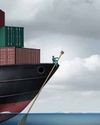
Few months back towards the end of the year 2019, the maritime industry was abuzz planning to comply with the IMO 2020 emission norms. Shipping lines were busy choosing among scrubbers and different fuel blends, shippers had kept their fingers crossed to calculate the additional fuel surcharge cost that they would have to shell out and the bunker suppliers were busy gearing up their production operations to meet the sudden surge in demand for low sulphur fuel. The shipping industry consumes about 4 million barrels per day (bpd) of marine bunker fuels and the rule changes impacted more than 50,000 merchant ships globally, opening a significant new market for fuel producers. India’s marine fuel demand is estimated at about 1.7 million tonnes per year, largely supplied by State-owned companies. Out of this, some 0.965 mmtpa is high sulphur furnace oil, while the rest is distillate fuel. At the start of 2019, low sulphur fuel sales accounted for just 8 per cent of total sales compared with a jump to 70 per cent in December.
“Majorly all global bunkering ports are keeping the maritime industry fuelled with IMO 2020 compliant low sulphur fuel oil (LSFO). Out of 34 major bunkering hub ports, only Sydney in Australia is not yet servicing the request of LSFO,” opines Capt Vivek S Anand, Director, NYK Line (India) Pvt. Ltd. “Usually the preferable bunkering port is where there is minimum diversion in trading route with competitive prices. However, preferred bunkering port is Singapore because of its strategic location and price of $290 or Fujairah with a price ranging around $280. India is well equipped to supply IMO 2020 compliant low sulphur fuel oil (LSFO) with 0.5 per cent sulphur as marine fuel at all Indian major trading Ports.”
This story is from the April 2020 edition of Maritime Gateway.
Start your 7-day Magzter GOLD free trial to access thousands of curated premium stories, and 9,000+ magazines and newspapers.
Already a subscriber ? Sign In
This story is from the April 2020 edition of Maritime Gateway.
Start your 7-day Magzter GOLD free trial to access thousands of curated premium stories, and 9,000+ magazines and newspapers.
Already a subscriber? Sign In

Impact Of Covid-19 On Shipping And Logistics
Industry stalwarts discuss threadbare the prevailing logistics and supply chain scenario and issues in clearing cargo during the COVID-19 lockdown

Digital Platforms Defy Lockdown
Digital trading modules such as eNAM are enabling farmers to move their produce from farm to market even during the lockdown

GARMENT TRADE TRAMPLED
As retailers face a shutdown in US and Europe, the cascading affect has caused mass cancellation of orders in Bangladesh

TRADE RESUMES WITH CHINA
While India has allowed uninterrupted movement of imports into Nepal even during lockdown, China is reopening its borders as it emerges from the pandemic
LESS HUMAN INTENSIVE, MORE DATA DRIVEN
AI provides transformational opportunity for logistics industry by improving customer experience, operational efficiency, faster turnaround time and lower cost while ensuring security and transparency. Macro environment requires industry to transform to be less human intensive, agile and data driven, all of which can be accelerated by AI adoption, shares Gangadhar Gude, Founder & CEO, atai.ai

SHAKEN AND STIRRED
The COVID-19 pandemic has partially paralysed the logistics and supply chain, but the industry is still deterred to ensure supply of essentials continues

TRADE STUCK, ECONOMY SLOWS DOWN
Sri Lankan economy slows down as trade deficit widens and supply chain disrupts amidst lockdown

LENDING INTELLIGENCE TO SUPPLY CHAIN
If you’re shipping millions of dollars’ worth of pharmaceuticals, high-end electronics, expensive seafood, or precious metals, what would you be willing to pay for the ability to ‘ask’ your shipment where it is right now and whether it’s ok? What would you pay for a freight smart enough to raise an alarm before it spoils? Artificial Intelligence enables that and much more…

CONTAINER LINES SIGNAL ‘SOS'
As the per-unit cost of operations increases many lines are forced to blank sailings which has hit their bottom line real hard. The Government and Terminal Operators therefore need to actively consider reduction in Vessel Related Costs

IMO 2020 And The Covid-19 Curse
The COVID-19 outbreak has shaken and stirred the already volatile bunker market. While the refiners adjust their capacities and shipping lines choose their path to compliance, the market dynamics are yet to reach an equilibrium